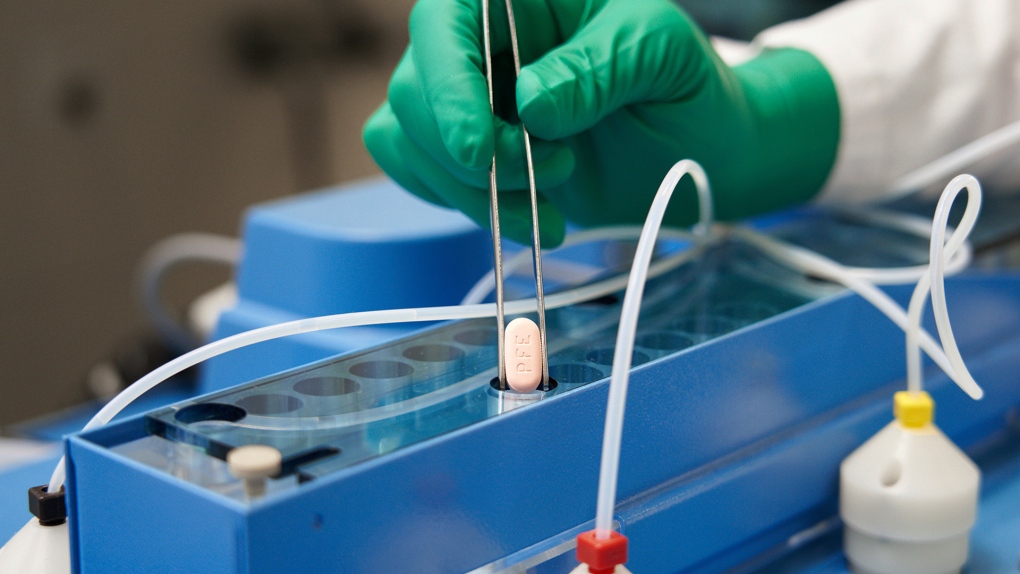New antiviral treatment for COVID-19 will be mostly set aside for use in older unvaccinated individuals and immunocompromised Ontarians
 This image provided by Pfizer in October 2021 shows the company's COVID-19 Paxlovid pills. (Pfizer via AP)
This image provided by Pfizer in October 2021 shows the company's COVID-19 Paxlovid pills. (Pfizer via AP)
A new antiviral drug that can be used to treat COVID-19 will be primarily set aside for use in older unvaccinated individuals and immunocompromised Ontarians.
The Ford government has released new eligibility guidelines that provide the first look at how it will distribute its limited supply of Pfizer’s Paxlovid pill, the first shipment of which arrived in the province last week.
The government says that it is prioritizing individuals at “the highest risk of severe outcomes,” including unvaccinated Ontarians age 60 and up and unvaccinated Ontarians aged 50 and up who also have one or more specific risk factors.
The government will also make all immunocompromised individuals aged 18 and up eligible, regardless of their vaccination status, as well as all unvaccinated First Nation, Inuit and Métis individuals aged 50 and up.
In order to access the drug those eligible will have to first test positive for COVID-19 and the Ford government says that it is now introducing “expanded COVID-19 assessment centres” where Ontarians will be able to access both testing and “outpatient therapeutics,” such as Paxlovid.
It says that the testing centres will have access to multiple testing options, including rapid tests, to asses those who may be eligible for treatment.
However, not all assessment centres will have the drug on hand.
According to data from the clinical trials, the Paxlovid pill was found to be 89 per cent effective at reducing the risk of hospitalization and death after a full course of treatment (three pills twice daily for five days in a row).
The Ontario government has said that it expects to receive approximately 10,000 courses of treatment in January.
“Given the very limited supply of antivirals, not all patients who meet the clinical eligibility criteria will be guaranteed access to treatment,” the government warns on a new website set up to provide information about antiviral treatments.
Paxlovid was approved by Health Canada on Jan. 17.
CTVNews.ca Top Stories

King Charles' cancer treatment progressing well, says Buckingham Palace
King Charles III’s doctors are 'sufficiently pleased' with his cancer treatment and he is expected to return to public-facing duties, Buckingham Palace announced on Friday.
Orca calf that was trapped in B.C. lagoon for weeks swims free
An orca whale calf that has been stranded in a B.C. lagoon for weeks after her pregnant mother died swam out on her own early Friday morning.
AFN chief says Air Canada offered a 15% discount after her headdress was mishandled
After the Assembly of First Nations' national chief complained to Air Canada about how staffers treated her and her ceremonial headdress on a flight this week, she says the airline responded by offering a 15 per cent discount on her next flight.
Regina police officer injured after being accidentally shot by fellow officer's gun
An investigation is underway after a Regina police officer was accidentally shot by a fellow officer’s gun during the search of a house early Friday morning.
Sophie Gregoire Trudeau on navigating post-political life, co-parenting and freedom
Sophie Gregoire Trudeau says there is 'still so much love' between her and Prime Minister Justin Trudeau, as they navigate their post-separation relationship co-parenting their three children.
DEVELOPING Bird flu outbreaks: WHO weighs in on public health risk
The current overall public health risk posed by the H5N1 bird flu virus is low, the World Health Organization said on Friday, but urged countries to stay alert for cases of animal-to-human transmission.
Taylor Swift dons Montreal designer's dress in 'Fortnight' video
A pair of Montreal designers' work has now been viewed over 41 million times. Taylor Swift dons a Victorian throwback black gown in her latest music video, 'Fortnight', designed by UNTTLD due Simon Belanger and Jose Manuel Saint-Jacques.
From faulty kids' cribs to flammable kids' bathrobes, here are the recalls of the week
Health Canada issued recalls for various items this week, including kids’ bathrobes, cribs and henna cones.
Island near Mull of Kintyre for sale for US$3.1 million
An idyllic 453-acre private island is up for sale off the west coast of Scotland and it comes with sandy beaches, puffins galore, seven houses, a pub, a helipad and a flock of black-faced sheep.
































